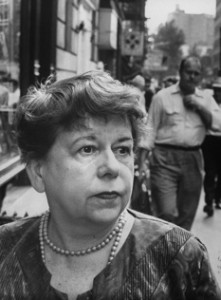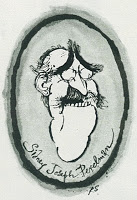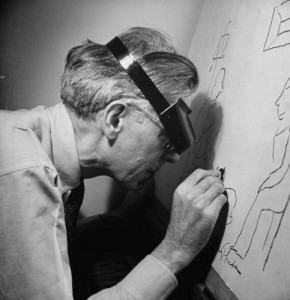 Dawn Powell and I go back a long way. I wrote about her in the New York Times Book Review in 1995, asking the same question that everybody asks: why isn’t so deliciously witty a writer more popular? Answer, alas, came there none:
Dawn Powell and I go back a long way. I wrote about her in the New York Times Book Review in 1995, asking the same question that everybody asks: why isn’t so deliciously witty a writer more popular? Answer, alas, came there none:
Every decade or so, somebody writes an essay about Dawn Powell, and a few hundred more people discover her work, and are grateful. And that’s it. Few American novelists have been so lavishly praised by so many high-powered critics to so little effect. Diana Trilling, writing in 1942, called Powell “our best answer to the familiar question, ‘Who really says the funny things for which Dorothy Parker gets credit?’”; Edmund Wilson, writing in 1962, judged her to be “quite on a level with…Anthony Powell, Evelyn Waugh and Muriel Spark”; Gore Vidal, writing in 1987, said she “should have been as widely read as, say, Hemingway or the early Fitzgerald.” No such luck. Dawn Powell remains today what she was a half-century ago: a fine and important writer adored by a handful of lucky readers in the know and ignored by everybody else.
Since then Powell has become a bit better known, thanks in small part to my review and in large part to Tim Page’s masterly 1998 biography. More recently her best novels were reprinted by the Library of America, thus ensuring that they will never again sink into the slough of unavailability that swallowed up her modest reputation for years after her death in 1965.
Now Tim has sent me a link to an astonishing Powell-related curiosity, an episode of a 1939 radio show on which she appeared. Except for an interview about the Group Theatre that was taped shortly before her death in 1965, it is the only surviving recording of Powell’s voice, and it’s interesting for all sorts of other reasons as well.
Author, Author was a prime-time literary quiz hosted by S.J. Perelman, one of The New Yorker’s resident “humorists,” as comic essayists used to be known in this country. It aired over the now-defunct Mutual Broadcasting System from April of 1939 to February of 1940. According to the announcer, “Listeners submit plot ideas with unexpected endings…Our authors are challenged to make up stories explaining those unexpected endings, and towards the end of the program, they act out a problem for our listening audience to solve.”
In addition to Perelman, Author, Author had two regular panelists, Heywood Broun and John Chapman, both of whom were fairly famous in the Thirties but are now as completely forgotten as Perelman himself is well on the way to becoming. Also present each week were a pair of guests, and on the night of October 9, 1939, they were none other than Dawn Powell and James Thurber.
Not at all surprisingly, Powell and Thurber were acquainted, as were most of the writers who lived in Manhattan in the Thirties (or so it seems, anyway). Both of them were emigrant urbanites born in Ohio toward the end of the nineteenth century, eventually moving east to set up shop as…well, humorists. Indeed, they had recently shared space in the August 26 issue of The New Yorker, she with a short story called “The Comeback” and he with a “Fable for Our Time.” Also present in the same issue was H.L. Mencken, who contributed “Memorials of Gormandizing,” which would later find its way into Happy Days.
 The program on which they appeared was clever enough, though not nearly as much so as it tried to be. It was, in fact, a too-obvious knockoff of Information Please, the smartest panel show ever to run on network radio in its golden age. It didn’t help that Perelman appears to have written his own elaborately polysyllabic script. (His style of humor was meant to be read, not spoken aloud.) Time dismissed the end product as “impaired by talkiness and the occasional complete blankness of literary minds,” which strikes me as just about right.
The program on which they appeared was clever enough, though not nearly as much so as it tried to be. It was, in fact, a too-obvious knockoff of Information Please, the smartest panel show ever to run on network radio in its golden age. It didn’t help that Perelman appears to have written his own elaborately polysyllabic script. (His style of humor was meant to be read, not spoken aloud.) Time dismissed the end product as “impaired by talkiness and the occasional complete blankness of literary minds,” which strikes me as just about right.
What’s interesting about the broadcast is, for openers, the mere fact of its existence. In 1939 and for many years afterward, it was possible to put a prime-time panel show on the air that featured guests like Dawn Powell and James Thurber. Try to imagine the same thing happening today and you’ll keel over laughing.
 Even more interesting, though, is the precious opportunity that this crackly-sounding aircheck provides to hear the speaking voices of two distinguished American writers. Thurber sounds very much like the Ohio expatriate he was, plain-spoken and flat-voweled. Powell, by contrast, has a medium-high voice that is at once twittery and slightly hesitant—rather like a clever little girl who says cynical things so sweetly that it takes a moment or two for you to register them and be shocked.
Even more interesting, though, is the precious opportunity that this crackly-sounding aircheck provides to hear the speaking voices of two distinguished American writers. Thurber sounds very much like the Ohio expatriate he was, plain-spoken and flat-voweled. Powell, by contrast, has a medium-high voice that is at once twittery and slightly hesitant—rather like a clever little girl who says cynical things so sweetly that it takes a moment or two for you to register them and be shocked.
While I can’t imagine going out of my way to seek out any other episodes of Author, Author, I’m very pleased to have listened to this one. As I wrote in a 2008 column, you always learn something worthwhile from the recorded voices of famous writers of the past:
Sometimes they inadvertently tell us things about themselves that we suspected but never knew for sure. Hearing Raymond Chandler’s mousy voice left me certain that he created the stalwart yet sensitive Marlowe as an act of wish fulfillment, allowing him to “do” on paper what he would never have dared do in real life. Other recordings deepen our understanding of already vivid literary personalities. H.L. Mencken was interviewed for the Library of Congress in 1948, and the gravelly speaking voice preserved in a surviving recording of that conversation is as homely as the man himself, the phrases coming in irregular, emphatic spurts, with every syllable bearing the heavily accented stamp of “Bawl-mer” (as native Baltimoreans, Mencken included, pronounce the name of their home town).
That’s why I’m delighted to add Powell and Thurber to my mental audio collection. I expect that you will be, too.
* * *
To listen to the October 9, 1939 episode of Author, Author, go here.
An interview with H.L. Mencken, recorded for the Library of Congress in 1948:
